Classroom Series
Latin American Perspectives in the Classroom:
Visit the Publisher’s Page
Editor: Ronald H. Chilcote, University of California, Riverside
Since its inception, Latin American Perspectives has worked to make its material available for classroom use. That goal is realized in this series of readers by introducing students to the important themes and issues about Latin America that have appeared in the journal. Accessible to nonspecialists, all books in the series comprise selected articles trimmed to their essential core and organized into teachable sections. Each text includes both general and part introductions to contextualize the concepts and topics that follow. Relevant to a broad range of student interests in the social sciences, these readers will be especially valuable in the Latin American studies curriculum. For more information and online purchasing discounts, click on the text graphics to visit Latin American Perspectives‘ in the Classroom Series at the Rowman Littlefield’s website. To view recent editions in the Critical Currents in Latin American Perspectives series, CLICK HERE.
RECENT EDITIONS
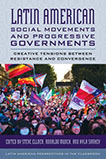 Latin American Social Movements and Progressive Governments: Creative Tensions between Resistance and Convergen
Latin American Social Movements and Progressive Governments: Creative Tensions between Resistance and Convergen
Edited by Steve Ellner, Ronaldo Munck, and Kyla Sankey
PURCHASE THIS EDITION
List Price: $39.00 paperback
ISBN: 9781538163948
Publication Date: September 2022
This book examines the tensions and convergences between social movements and twenty-first century progressive Latin American governments. Focusing on feminist, indigenous, environmental, rural, and labor movements, leading scholars present a well-rounded picture on a controversial topic and argue against the accepted view that robust Latin American social movements are independent of the state. This cutting-edge book will be an invaluable supplement for Latin American studies and beyond for courses on democracy, peace studies, labor studies, gender studies, and ethnic studies.
REVIEW: Framed by conceptually engaging essays by some of the leading scholars in the field, this impressive volume offers a state-of-the-art primer on the dynamic relations between progressive states and new social movements in twenty-first-century Latin America. Broad enough to embrace the significantly different regimes that have been viewed as representatives of Latin America’s embattled but resilient Pink Tide, this unique collaboration effectively dissects the ‘creative tensions’ that have imbricated states and social movements in Pink Tide and neoliberal politics. It makes clear that an earlier generation of scholarship that stressed the autonomy of social movements must be reassessed. Not least, the collection’s ability to render complex political phenomena in very clear terms will make it indispensable for undergraduate courses on contemporary Latin America.
Reviewer: Gilbert M. Joseph, co-author of Mexico’s Once and Future Revolution: Social Upheaval and the Challenge of Rule since the Late Nineteenth Century
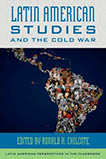 Latin American Studies and the Cold War
Latin American Studies and the Cold War
Edited by Ronald H. Chilcote
PURCHASE THIS EDITION
List Price: $39.00 paperback
ISBN: 9781538141588
Publication Date: March 2022
With a unique international scope, this timely text traces the impact of the ongoing Cold War on the transformation of the field of Latin American studies in the United States, United Kingdom, Netherlands, Germany, Czechoslovakia, Soviet Union, China, and Cuba. Drawing on unpublished documents, the book highlights how the new generation of academics challenged the mainstream Cold War consensus and opened the field to progressive theoretical currents. This book provides an essential foundation for new directions in the field of Latin American studies for academics and students.
REVIEW: This book is the definitive volume on the counterrevolutionary impetus behind the growth of Latin American studies in the United States as well as the more diverse roots of the discipline elsewhere. It also highlights the limits of Cold Warriors’ control, showing how some scholars forcefully challenged imperial doctrine. Understanding this intellectual history is vital at a time when the Cold War’s legacies continue to loom large in society, academia, and the press—and as today’s Cold Warriors recklessly pound the drums for confrontation with US rivals.
Reviewer: Kevin Young, editor, Making the Revolution: Histories of the Latin American Left
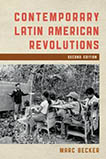 Contemporary Latin American Revolutions
Contemporary Latin American Revolutions
Second Edition
by Marc Becker
PURCHASE THIS EDITION
List Price: $34.00 paperback
ISBN: 9781538163733
Publication Date: January 2022
Revolutions are a commonly studied but only vaguely understood historical phenomenon. Now updated to include the perspectives of grassroots revolutionary movements and biographies of often marginalized voices, this clear and concise text extends our understanding with a critical narrative analysis of key case studies: the 1910–1920 Mexican Revolution; the 1944–1954 Guatemalan Spring; the 1952–1964 MNR-led revolution in Bolivia; the Cuban Revolution that triumphed in 1959; the 1970–1973 Chilean path to socialism; the leftist Sandinistas in Nicaragua in power from 1979–1990; failed guerrilla movements in Colombia, El Salvador, and Peru; and the Bolivarian Revolution in Venezuela after Hugo Chávez’s election in 1998. Historian Marc Becker opens with a theoretical introduction to revolutionary movements, including a definition of what “revolution” means and an examination of factors necessary for a revolution to succeed. He analyzes revolutions through the lens of those who participated and explores the sociopolitical conditions that led to a revolutionary situation, the differing responses to those conditions, and the outcomes of those political changes. Each case study provides an interpretive explanation of the historical context in which each movement emerged, its main goals and achievements, its shortcomings, its outcome, and its legacy. The book concludes with an analysis of how elected leftist governments in the twenty-first century continue to struggle with issues that revolutionaries confronted throughout the twentieth century.
REVIEW: A splendid introduction to and survey of revolutionary movements in Latin America beginning with the Mexican Revolution and ending with the left turn embracing Venezuela’s Bolivarian Revolution led by Hugo Chávez. Biographies of key protagonists are accompanied by documents and guides to further reading. This is a splendid introduction to Lain American revolutionary traditions with a much-needed focus on the role of women and Indigenous peoples.
Reviewer: Barry Carr, La Trobe University, Australia

Latin American Extractivism: Dependency, Resource Nationalism, and Resistance in Broad Perspective
By Steve Ellner
List Price: $39.00 paperback
ISBN: 978-1-5381-4156-4
Publication Date: December 2020
This book explores different aspects of Latin America’s extractivist economies and argues that on issues such as legislation and policies toward foreign capital and small-scale mining, economic ties with China, environmental destruction and indigenous rights, Latin American governments had different records. In doing so, the book takes issue with a school of writers referred to as “neo-extractivism,” who tend to minimize the importance of differences between Pink Tide progressive governments, conservative ones and those on the right on grounds that all of them have submitted themselves to the dictates of global capital. Several chapters look at cultural patterns involving gender, ethnicity and class that lay behind protests in opposition to extractivist projects as well as the contrast in responses from state actors to those movements. The book also compares the impact of strategies toward economic development as they relate to extractivism and analyzes the role of the state in promoting economic growth and its theoretical implications. In emphasizing resource nationalism, the book attempts to refute a basic precept of neo-extractivism writers that a “consensus” existed among Latin American governments on extractivism. The book argues that there may have been a consensus regarding the beneficial nature of extractivist industries, but not on how to maximize the revenue derived from extractivism, and how to put it to good use.
REVIEW: Steve Ellner and his colleagues have produced a timely and invaluable study on the political and economic balance sheet of the extractivist strategy of development in Latin America. The varied contributions show that there was no one model of extractivism. Rather, the process has been highly contested and differentiated among Latin American countries, in particular, among left-oriented governments who pursued resources nationalism and the more conservative regimes who allied with global capital and followed a more openly neoliberal path. The collection of essays, beyond the specific focus on extractivism, provides an essential guide to making sense of Latin America’s recent past and possible futures. As global capitalism now sinks into its worse crisis in a century, all bets are off. This volume provides great insight at a critical moment into the nature of the dynamics of global capitalism, as well as the choices before us as we enter the third decade of the twenty-first century.
• Reviewer: William I. Robinson, University of California at Santa Barbara; author of The Global Police State
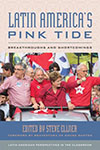 Latin America’s Pink Tide: Breakthroughs and Shortcomings
Latin America’s Pink Tide: Breakthroughs and Shortcomings
By Steve Ellner
List Price: $39.00
ISBN: 978-1-5381-2563-2
Publication Date: October 2019
Latin America’s Pink Tide received Choice Outstanding Academic Title for 2020.
This timely book analyzes the governing experiences of the nine major pro-leftist governments in Latin America. The individual country case study chapters are preceded by chapters that frame the discussion by considering the theoretical implications of the Pink Tide experience relating to globalization, the state, and neo-extractivism. The contributors examine the Pink Tide policies and rhetoric that gained widespread approval and led to the long tenure of many of these governments. These included ambitious social programs, prioritizing the needs of the poor, nationalistic foreign policy, economic nationalism, and asserting control of strategic sectors of the economy. The book continues by taking a critical look at policies that have contributed to recent setbacks, acknowledging the inability of progressive governments to overcome embedded structures holding back economic development. One such setback has come from the opposition—often supported by powerful foreign actors—pressuring the government into making concessions and carrying out policies that ultimately undermined economic and political stability. The contributors critically examine these policies, which were politically successful in the short run but eventually backfired in the form of corruption, bureaucratic waste, and economic sluggishness. With its balanced and thorough assessment, this book will provide readers with a deep and nuanced understanding of the complexity of the political, economic, and sociocultural reality of contemporary Latin America and the Caribbean.
REVIEW: As the momentum behind Latin America’s left recedes, this important, cohesive, timely volume, edited by Ellner, a well-known scholar of Latin America, takes stock of the successes and failures of the Pink Tide. Separate chapters consider “radical” Pink Tide governments (Hugo Chávez in Venezuela, Evo Morales in Bolivia, Rafael Correa in Ecuador), “pragmatic” Pink Tide governments (the Workers’ Party in Brazil, the Frente Amplio in Uruguay, and “Kirchnerism” in Argentina), and the left in Nicaragua, El Salvador, and Mexico. One of the volume’s core arguments is that aspirations for structural transformation were severely constrained by the hegemony of global capitalism as Pink Tide governments largely maintained “extractivist” economic models based on commodity exports. However, despite these constraints, these governments sought to reduce social and economic injustice and succeeded, according to the authors. Contributing scholars hail from diverse countries, providing a wealth of valuable information for each case study. They effectively engage with questions regarding the implications of global capitalism’s hegemony for the political economy of Latin America, though this reviewer would have liked them to wrestle more vigorously with questions drawn from the dictum “absolute power corrupts absolutely.”
Summing Up: Highly recommended. Upper-division undergraduates, graduate students, and professionals.
• Reviewer: C. McClintock, George Washington University
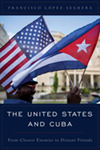 The United States and Cuba: From Closest Enemies to Distant Friends
The United States and Cuba: From Closest Enemies to Distant Friends
By Francisco López Segrera
List Price: $25.00
ISBN: 978-1-4422-6722-0
Publication Date: April 2017 140pp
This timely book takes the historic restoration of diplomatic ties between Cuba and the United States in 2015 as the point of departure for a Cuban perspective on future relations. Tracing the history of the long and contentious relationship, Francisco López Segrera analyzes the pre-revolutionary and Cold War periods as well as more recent changes within each nation and in the international environment that led to the diplomatic opening and the abandonment of regime change as the goal of U.S. policy. He considers factors such as the declining influence of hard-line Cuban exiles in the United States; almost universal calls from Latin America, Europe, and other U.S. allies for constructive diplomatic engagement; and the economic restructuring underway in Cuba following the crisis of the “Special Period” triggered by the collapse of the Soviet Union. The author also identifies conditions favoring further progress, as well as outstanding issues that may constitute barriers—especially the blockade, U.S. demands for a Western-style democracy in Cuba, and its refusal to return the Guantánamo naval base to Cuban sovereignty. Comparing the differing perceptions shaping policies on both sides, López Segrera weighs the steps that will be necessary for the two countries to move toward full normalization.

Twentieth-Century Latin American Revolutions
By Marc Becker
List Price: $30.00
ISBN: 978-1-4422-6587-5
Publication Date: June 2017 272pp
Revolutions are a commonly studied but only vaguely understood historical phenomenon. This clear and concise text extends our understanding with a critical narrative analysis of key case studies: the 1910–1920 Mexican Revolution; the 1944–1954 Guatemalan Spring; the 1952–1964 MNR-led revolution in Bolivia; the Cuban Revolution that triumphed in 1959; the 1970–1973 Chilean path to socialism; the leftist Sandinistas in Nicaragua in power from 1979–1990; failed guerrilla movements in Colombia, El Salvador, and Peru; and the Bolivarian Revolution in Venezuela after Hugo Chávez’s election in 1998. Historian Marc Becker opens with a theoretical introduction to revolutionary movements, including a definition of what “revolution” means and an examination of factors necessary for a revolution to succeed. He analyzes revolutions through the lens of those who participated and explores the sociopolitical conditions that led to a revolutionary situation, the differing responses to those conditions, and the outcomes of those political changes. Each case study provides an interpretive explanation of the historical context in which each movement emerged, its main goals and achievements, its shortcomings, its outcome, and its legacy. The book concludes with an analysis of how elected leftist governments in the twenty-first century continue to struggle with issues that revolutionaries confronted throughout the twentieth century.

Memory, Truth, and Justice in Contemporary Latin America
Edited by Roberta Villalón
List Price: $37.00 Discount code: RLFANDF25 for a 25% off discount!
ISBN: 978-1-4422-6725-1
Publication Date: July 2017 280pp
As new social actors have emerged in Latin America, the process of dealing with the legacy of still-unresolved human rights abuses has been significantly reinvigorated. This powerful text provides the first systematic analysis of the second wave of memory and justice mobilization throughout the region. A multidisciplinary group of authors, many from the global south, consider the changed political, economic, and social conditions that have led to new forms of social action. They trace the growth of human rights groups as fundamental political organizations in the post-dictatorship era, the participation of public authorities in the investigation and persecution of human rights abusers, and the implementation of national and international human rights legislation. Pairing clear explanations of concepts and debates with cases studies, the book offers a unique opportunity for students to understand and interpret the history and politics of a range of Latin American countries.

Urban Latin America: Inequalities and Neoliberal Reforms
Edited by Tom Angotti
List Price: $35.00
ISBN: 978-1-4422-7448-8
Publication Date: August 2017 306pp
Latin America is one of the most urbanized regions of the world. To understand Latin America today it is important to trace the origins and characteristics of the urban-rural divide, inequalities within urban areas, and the prospects for change. This is particularly important and timely given the challenges of widening environmental and social disparities, climate change, and climate justice. The authors critically analyze urban issues within the context of the national and regional political economy, neoliberal governance, and urban social movements. Latin America’s cities are sharply divided into wealthy enclaves and large peripheral areas, reflecting deep social and economic inequalities, leading to notable movements and reforms. This text explores Latin American cities, their history, similarities and differences, and current problems.
REVIEW: By most measures, Mexico City and São Paulo are two of the 10 largest cities in the world; the regional population in each is over 20 million people. With the global population rapidly expanding and living in urban areas, and with almost all projected megacities located in Latin America, Asia, and Africa, it would be prudent to have a better understanding of how cities develop and what impact neoliberal policies and growing inequalities have on urban society. This collection of 16 essays uncovers the inner workings of Latin American cities, provides a look at political processes and forms of resistance, brings to life the people who inhabit these cities, and presents readers with alternative narratives to traditional urban development as it has come to be understood in North America. By exploring alternatives to markets; by outlining forms of community control, budgeting, and opposition to neoliberal policies; and by celebrating the occupants of cities through the rejection of stereotypes like “marginal” and “informal,” Angotti’s volume takes its place as an important addition to literature on urbanization globally. Summing Up: Highly recommended. Upper-division undergraduates and above.
Reviewer: D. Fasenfest, Wayne State University
 Rethinking Latin American Social Movements: Radical Action From Below
Rethinking Latin American Social Movements: Radical Action From Below
Edited By Richard Stahler-Sholk; Harry E. Vanden and Marc Becker
Latest Publication available November 2014
List Price: $39.95
ISBN: 978-1-4422-3568-7
Publication Date: November 2014 416pp
This groundbreaking text explores the dramatic evolution in Latin American social movements over the past fifteen years. Leading scholars examine a variety of cases that highlight significant shifts in the region. First is the breakdown of the Washington Consensus and the global economic crisis since 2008, accompanied by the rise of new paradigms such as buen vivir (living well). Second are transformations in internal movement dynamics and strategies, especially the growth of horizontalism (horizontalidad), which emphasizes non-hierarchical relations within society rather than directly tackling state power. Third are new dynamics of resistance and repression as movements interact with the “pink tide” rise of left-of-center governments in the region. Exploring outcomes and future directions, the contributors consider the variations between movements arising from immediate circumstances (e.g., Oaxaca’s 2006 uprising and Brazil’s 2013 bus fare protests) and longer-lasting movements (Vía Campesina, Brazil’s MST, and Mexico’s Zapatistas). Assessing both the continuities in social movement dynamics and important new tendencies, this book will be essential reading for all students of Latin American politics and society.
List of Contributions
Marc Becker, George Ciccariello-Maher, Kwame Dixon, Fran Espinoza, Daniela Issa, Nathalie Lebon, Maurice Rafael Magaña, Maria Elena Martinez-Torres, Sara C. Motta, Leonidas Oikonomakis, Suyapa Portillo Villeda, Peter M. Rosset, Marina Sitrin, Rose J. Spalding, Richard Stahler-Sholk, Alicia Swords, Harry E. Vanden, and Raúl Zibechi
 Latin America’s Radical Left: Challenges and Complexities of Political Power In The Twenty-First Century
Latin America’s Radical Left: Challenges and Complexities of Political Power In The Twenty-First Century
Edited by Steve Ellner
Foreword by William I. RobinsonPURCHASE THIS EDITION
ISBN: 978-1-4422-2949-5
Publication Date: March 2014 306pp
Marc Becker, Roger Burbach, George Ciccariello-Maher, Héctor M. Cruz-Feliciano, Steve Ellner, Federico Fuentes, Marcel Nelson, Hector Perla Jr., Camila Piñeiro Harnecker, Thomas Purcell, Diana Raby, William I. Robinson, and Kevin Young
 Contemporary Latin American Social and Political Thought: An Anthology
Contemporary Latin American Social and Political Thought: An Anthology
Edited by Iván MárquezPURCHASE THIS EDITION
ISBN: 978-0-7425-3992-1
Publication Date: February 2008 406pp
List of Contributors
About the Editor Iván Márquez is associate professor of philosophy at Bentley College.
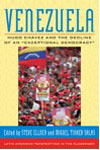 Venezuela: Hugo Chávez and the Decline of an “Exceptional Democracy”
Venezuela: Hugo Chávez and the Decline of an “Exceptional Democracy”
Edited by: Steve Ellner and Miguel Tinker Salas
ISBN: 978-0-7425-5456-6
Publication Date: December 2006 236pp
This authoritative book offers a comprehensive assessment of contemporary Venezuela. Analyzing the multifaceted phenomenon of Hugo Chavez, leading scholars move beyond his flamboyant style to focus on the concerns of popular social and political movements. The book challenges the misleading notions that for several decades glorified Venezuelan “exceptionalism” has minimized the role of important actors. After setting the historical and socio-economic contexts, the contributors explore racial issues, social and labor movements, electoral politics, economic and oil policy, and United States support for the Venezuelan opposition. Underscoring the complexity of Chavez and his popularity, the book highlights the need to avoid simplistic assessments of the past and present and offers a clear-eyed understanding of Venezuelan reality today.
List of Contributors
Christopher I. Clement, Steve Ellner, Maria Pilar Garcia Guadilla, Daniel Hellinger, Jesus Maria Herrera Salas, Edgardo Lander, Dick Parker, Cristobal Valencia Ramirez.
 Development in Theory and Practice: Latin American Perspectives
Development in Theory and Practice: Latin American Perspectives
Edited by Ronald H. Chilcote.
ISBN: 978-0-7425-2393-7
Publication Date: June 2003 408pp
This definitive reader brings together seminal articles on development in Latin America. Tracing the concepts and major debates surrounding the issue, the text focuses on development theory through three contrasting historical perspectives: imperialism, underdevelopment and dependency, and globalization. By offering a rich array of essays from Latin American Perspectives, the book allows students to sample all the important trends in the field. A new general introduction and conclusion, along with part introductions, contextualize each selection.One of the leading figures in development studies, Ronald Chilcote shows in this text why work on imperialism dating to the turn of the twentieth century informs the controversies on dependency and underdevelopment during the 1960s and 1970s as well as the globalization debates of the past decade. If students are to understand development in Latin America, they must not only be familiar with historical examples and recognize that various theoretical perspectives affect our interpretation of events, they must be willing to keep an open mind. Thus, rather than setting out established premises, this reader offers different points of view, raising provocative questions about Latin America that remain largely unanswered even today. Students will come away from this rewarding collection ready to pursue new understanding through critical inquiry and thinking.
 Mayan Lives, Mayan Utopias: The Indigenous Peoples of Chiapas and the
Mayan Lives, Mayan Utopias: The Indigenous Peoples of Chiapas and the
ZapatistaRebellion
Edited by Jan Rus, Rosalva Aída Hernández Castillo, and Shannan L. Mattiace.
ISBN: 978-0-7425-1147-4
Publication Date: September 2003 328pp
 Rereading Women in Latin America and the Caribbean: The Political Economy of Gender
Rereading Women in Latin America and the Caribbean: The Political Economy of Gender
Edited by Jennifer Abbassi and Sheryl L. Lutjens.
PURCHASE THIS EDITIONISBN: 978-0-7425-1075-3
Publication Date: March 2002 320ppThis indispensable text reader provides a broad-ranging and thoughtfully organized feminist introduction to the ongoing controversies of development in Latin America and the Caribbean. Designed for use in a variety of college courses, the volume collects an influential group of essays first published in Latin American Perspectives–a theoretical and scholarly journal focused on the political economy of capitalism, imperialism, and socialism in the Americas. The reader is organized into thematic sections that focus on work, politics, and culture, and each section includes substantive introductions that identify key issues, trends, and debates in the scholarly literature on women and gender in the region.Demonstrating the rich and multidisciplinary nature of Latin American studies, this collection of timely, empirical studies promotes critical thinking about women’s place and power; about theory and research strategies; and about contemporary economic, political, and social conditions in Latin America and the Caribbean. Valuable as both a supplementary or primary text, Rereading Women makes a convincing claim for a materialist feminist analysis. It convincingly shows why women have become an increasingly important subject of research, acknowledges their gains and struggles over time, and explores the contributions that feminist theory has made toward the recognition of gender as a relevant–indeed essential–category for analyzing the political economy of development.
 Transnational Latina/o Communities: Politics, Processes, and Cultures
Transnational Latina/o Communities: Politics, Processes, and Cultures
Edited by Carlos G. Vélez-Ibáñez and Anna Sampaio with Manolol González-Estay
PURCHASE THIS EDITIONISBN: 978-0-7425-1703-5
Publication Date: August 2002 320pp
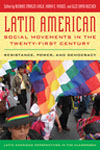 Latin American Social Movements in the Twenty-first Century: Resistance, Power, and Democracy
Latin American Social Movements in the Twenty-first Century: Resistance, Power, and Democracy
Edited by Richard Stahler-Sholk, Harry E. Vanden, and Glen David Kuecker
ISBN: 978-1-4616-0190-6
Publication Date: April 2008 404ppWhen elected civilians replaced military authoritarian regimes in Latin America in the 1980s, democracy seemed at hand. Yet those nominally democratic regimes implemented widely unpopular neoliberal policies, opening the economies to global market forces with devastating impact on the poor. This clearly written and comprehensive text examines the uprising of politically and economically marginalized groups in Latin American societies. Specialists in a broad range of disciplines interpret the new wave of social movements, including movements in Mexico, Ecuador, Bolivia, Brazil, Colombia, Chile, and Argentina, the Vía Campesina global peasant network, and Mesoamerican coalitions against regional free trade agreements. This volume assembles original research from a variety of case studies in a student – friendly format. Section introductions help students contextualize the essays, highlighting social movement origins, strategies, and outcomes. Thematic sections address historical context, political economy, community-building and consciousness, ethnicity and race, gender, movement strategies, and transnational organizing, making this book useful to anyone studying the wide range of social movements in Latin America.

